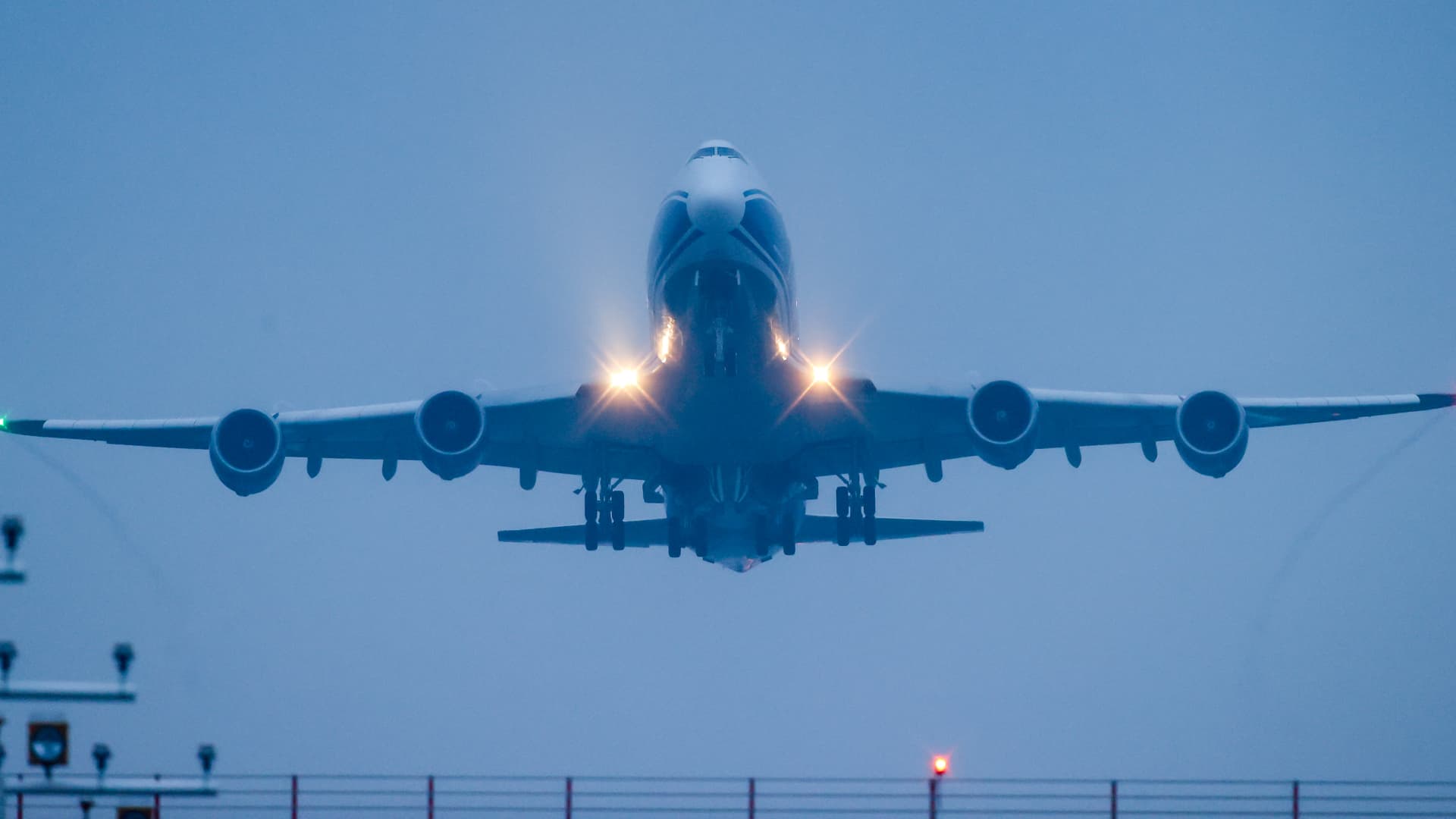
A Boeing 747-8F operated by AirBridgeCargo takes off from Leipzig/Halle Airport.
Jan Woitas | Picture Alliance | Getty Images
The cost of transporting goods by air has surged since Russia’s invasion of Ukraine last week, just as consumers are already grappling with the fastest pace of inflation in nearly 40 years.
Carriers, including KLM Royal Dutch Airlines and United Parcel Service, are filling their planes with pricier fuel for longer Asia routes to avoid Russia due to airspace closures. Jet fuel prices in the United States this week hit the highest in more than a decade.
The U.S. on Tuesday joined Canada and much of Europe in barring Russian aircraft from its airspace. In January, more than 2,500 flights that departed the U.S. used Russian airspace, while 493 flights from Russia used U.S. airspace, according to aviation data firm Cirium.
“With the uncertainty of Russian airspace restrictions to civilian aircraft, UPS decided on Mar. 1 to avoid use of Russian airspace for our Northern Pacific (NOPAC) operations until further notice,” UPS’ pilots union told aviators Wednesday.
Higher transportation costs are likely to get passed along to consumers as it gets pricier to ship everything from manufacturing components to perishables like imported cheese and fruit. Commodity prices from wheat to aluminum are already spiking.
The U.S. ban of Russian aircraft included cargo giant Volga-Dnepr, which flies large aircraft pieces like wing parts for some Boeing jets.
“We work closely with our wide range of supply chain and logistics partners to manage through any potential impacts,” the aircraft manufacturer said in a statement.
Seasonal slump no more
Some carriers are canceling flights altogether, and Russian airlines have been hobbled by airspace bans. The reduced capacity is driving up rates during what is normally a seasonal lull for shipping in the months after year-end holidays.
Air cargo rates from China to Europe jumped 80% this week from last to $11.36 a kilogram, the highest since October, according to freight booking and data platform Freightos.
FedEx on Thursday said it its Express unit is increasing surcharges for international packages and freight. Some peak surcharges will more than double – such as the rate for shipping from Hong Kong to Europe, Africa and the Middle East, which the company will raise from 55 cents a pound to $1.20 a pound, according to a notice on its website.
“As we come up on the two-year anniversary of COVID-19, the industry is still reeling from the capacity and pricing ramifications of the Pandemic,” Stifel logistics analyst Bruce Chan said in a note this week. “As a result, subsequent supply shocks will be felt more acutely, as there is less of a capacity buffer to absorb them.”
Air cargo demand and prices have soared over the past two years. Carriers reaped the rewards of customers who paid a premium to fly over port snarls and make up for other supply chain backups, getting goods to factories and consumers faster.
Stronger e-commerce demand in the pandemic and limited aircraft belly capacity as international passenger travel plunged has kept rates firm, even before Russia’s invasion.
Now costs are going up even more, testing how much customers are willing to pay air cargo haulers and how much consumers will shell out at retailers.
Surging fuel costs
U.S. benchmark jet fuel on Friday was going for more than $3.882 a gallon, the highest since September 2008. Matthew Kohlman, associate director for refined products pricing at S&P Global Commodity Insights, called price jumps this week “hurricane-level” because they haven’t been so steep since Hurricane Ike slammed into Texas that month.
Benchmark jet fuel in Asia this week hit a more than eight-year high while Europe’s benchmark rose to the highest since August 2008, according to S&P data.
Freightos said ocean shipping rates could also continue to rise as a result of the war in Ukraine. The Asia-to-U.S. West Coast price on Thursday was $16,155 per 40-foot equivalent container, more than triple the rate from the same time last year.
New port backups could drive even higher demand for airfreight.
“A lot of the time it’s, ‘I need these goods to keep my supply line open,'” said Jason Seidl, managing director and airfreight and surface transportation analyst at Cowen & Co. “The cost of it not being there is very high.”







